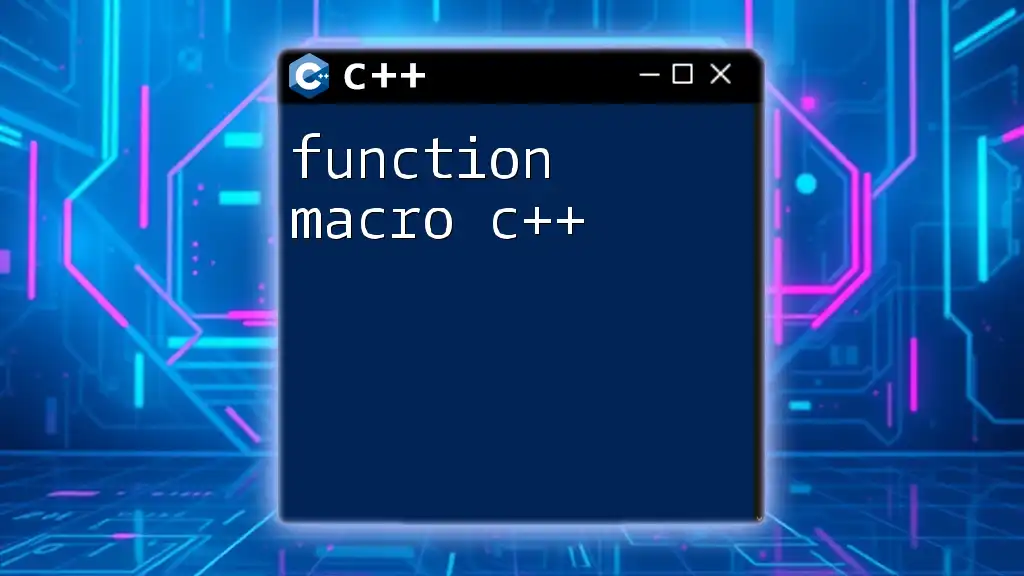In C++, a function declaration specifies the function's name, return type, and parameters without providing the function's body, allowing the compiler to know about the function before its actual definition.
Here’s an example of a function declaration in C++:
int add(int a, int b);
What is Function Declaration in C++?
Definition of Function Declaration
In C++, a function declaration (also known as a function prototype) serves as a promise that a certain function will be defined later in the code. It specifies the function's name, its return type, and any parameters it accepts. This allows the compiler to understand how to handle the function calls correctly, even if the full implementation (definition) comes later.
Syntax of Function Declaration
The general syntax for declaring a function in C++ is as follows:
return_type function_name(parameter_type1 parameter_name1, parameter_type2 parameter_name2, ...);
This format helps clarify what the function is expected to return and what arguments it needs. For instance:
int add(int a, int b);
In this example, `add` is the function name, it returns an `int`, and it takes two parameters of type `int`.

How to Declare Function in C++
Basic Syntax
When you're ready to declare your function, remember to follow the basic syntax strictly. Let's look at another example:
float calculateArea(float radius);
In this case, `calculateArea` is the function designed to return a `float` value, which represents the area of a circle given its radius.
Function Declaration with No Return Type
Not all functions return a value. For such cases, you can declare a function with the `void` return type.
void printMessage();
This declaration indicates that the `printMessage` function does not return any value; it simply performs an action.
Function Declarations with Parameters
Creating functions that take parameters is a common practice to enhance functionality. Here’s how you can declare a function that takes parameters:
void greetUser(std::string name, int age);
In this function declaration, `greetUser` is designed to accept a `std::string` for the user's name and an `int` for their age.

C++ Declaring Functions
The Role of Function Prototypes
A function prototype is simply the declaration of a function without its body. Function prototypes allow you to call functions before they are defined in the code, which can be especially helpful for organizing larger programs.
For instance:
void display();
This is a prototype declaration. If you later define the function like this:
void display() {
std::cout << "Hello World";
}
You can call `display()` before its definition, making your code cleaner and easier to maintain.
Common Mistakes in Function Declaration
Many novice programmers run into common pitfalls during function declaration. Here are some issues to watch out for:
-
Mismatched Return Types: If you declare a function to return `int` but define it to return `float`, this will lead to errors.
-
Parameter Issues: Declaring a function with different types or counts of parameters inconsistently can lead to confusion.
For example:
void processData(int value);
If you try to call `processData(3.14);`, it will throw an error because the parameter type does not match.

How to Define a Function in C++
Syntax for Function Definition
Once you've declared a function, the actual definition includes the body of the function, which tells the program what to do when the function is called. The syntax for defining a function aligns closely with its declaration but includes the function's body in braces `{ }`.
Example:
int add(int a, int b) {
return a + b;
}
In this example, the `add` function is not only declared but also defined to return the sum of two integers.
Function Definition with Multiple Parameters
When you define functions that accept multiple parameters, the syntax remains similar.
float calculateArea(float radius) {
return 3.14159 * radius * radius;
}
Here, we define `calculateArea` to perform the computation of a circle's area using the parameter `radius`.

Best Practices in Function Declarations
Consistency in Naming Conventions
Using consistent and descriptive names for functions is crucial for maintaining code readability. Good naming conventions help others (and your future self) understand the purpose of a function without needing to dive into its details. Avoid vague names like `doSomething`; instead, use specific names like `calculateTotalPrice`.
Commenting and Documentation
Documenting function declarations is vital for anyone reviewing your code later. Clear comments above your function declarations can describe what the function does, its parameters, and return types.
Example:
// This function calculates the area of a circle.
// It takes the radius as input and returns the area.
float calculateArea(float radius);
Optimization Tips
To further enhance your coding practices, consider optimizing function declarations by:
- Reducing the number of parameters when possible to avoid complexity.
- Utilizing default parameters to provide flexibility in how the function is called.
For example:
void logMessage(std::string message, int level = 1);
This allows you to call `logMessage("Hello")` and use the default logging level while still having the option to specify it.

Conclusion
In this guide, we have explored the intricacies of function declaration in C++. From understanding their definitions and syntax to recognizing common pitfalls and best practices, mastering function declarations is foundational to writing effective and efficient C++ code. By embracing these principles, you can enhance your programming skills significantly and lead yourself to greater coding efficiency and clarity.

Call to Action
If you are eager to dive deeper into C++ commands and functions, consider joining our dedicated course tailored to build your programming expertise. Don’t hesitate to explore further resources or related blog posts to keep enhancing your skills!

















